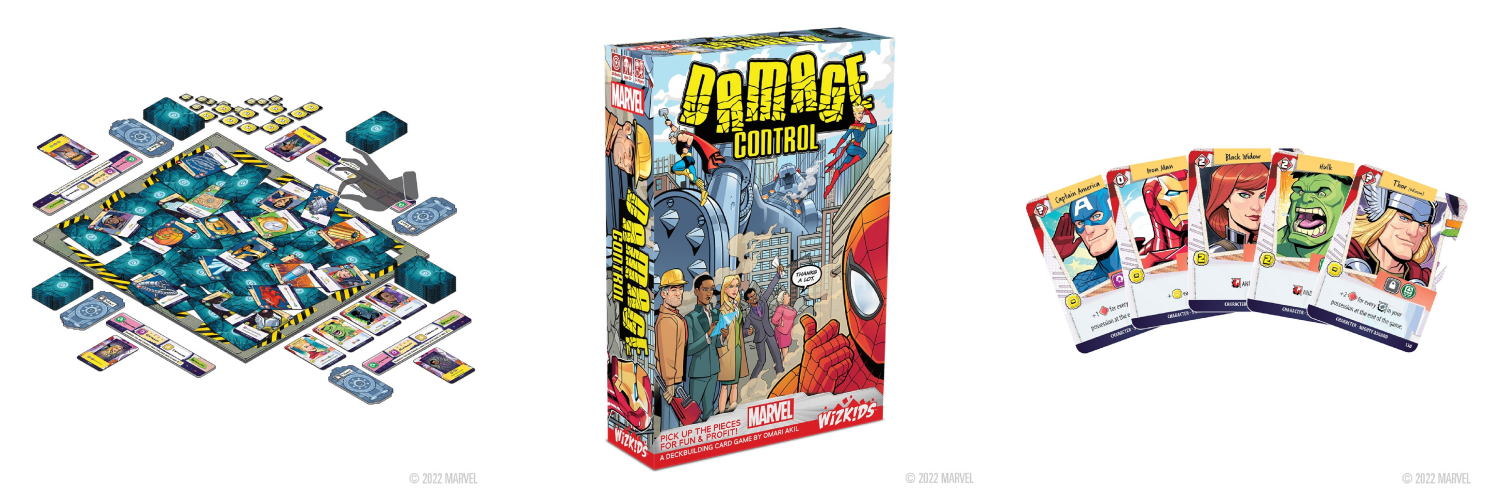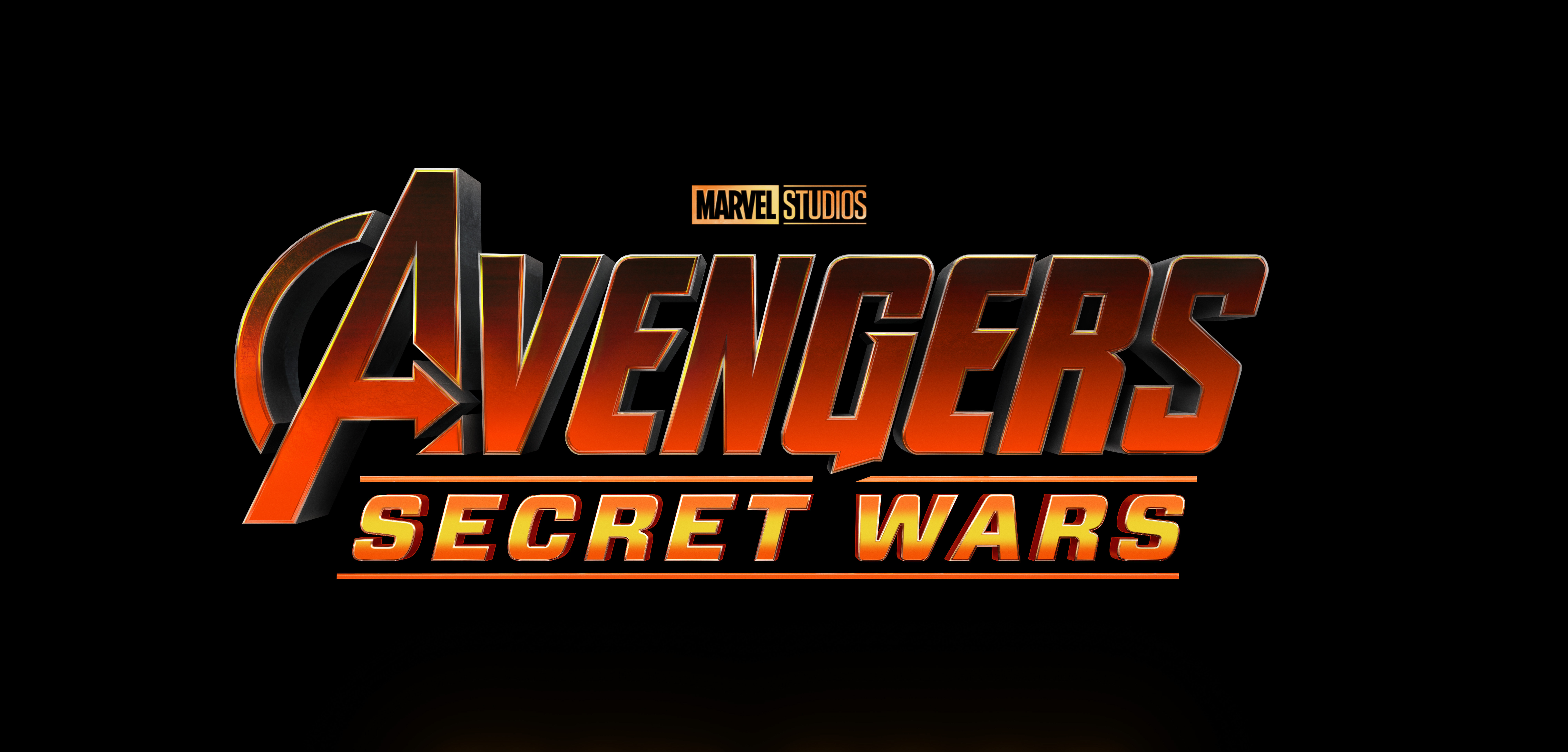Marvel: Damage Control by WizKids
Price: ~$35.00
Players: 1 to 4
Playtime: 30 minutes
Perfect for: Individuals who enjoy fast-paced, engine-fueled deck builders with an affinity for all things Marvel.
Marvel: Damage Control is a game of clean up and acquisition. While everyone deep down appreciates the safeguarding and security local superheroes provide, sometimes their work gets messy. Real messy. And beyond all the “natural” destruction, battles often result in heroes or villains carelessly leaving dangerous artifacts and technology just out in the open! That’s where you come in. Lead a crew of contractors to dive into the debris and uncover objects of value to keep the city safe and maybe turn a profit in the process.
To begin Marvel: Damage Control two to four players assemble the game area: four borders that will constitute the play area. The group then chooses which sets of cards to play with and gives everything a shuffle. The selected cards will influence gameplay in various ways. For example, using the Mighty Asgard set will result in more aggressive “take that,” style of game. Each player gets a starter deck and then drops random cards into the center of the play area. These are the artifacts that will allow people to build their deck, recruit characters, and score victory points (VP) at the end.
RELATED: Tabletop Game Review – Marvel: Age of Heroes
On a Marvel: Damage Control turn, a player will use all the cards in their hand to perform actions, gain influence tokens, and sometimes both. Actions include procuring new cards from the main pile (known as rubble), uncovering new cards, removing cards from the game, and sending cards to the vault (which locks in their VP). Some of the more powerful cards grant additional actions, but require that players spend influence tokens to use them. In addition, players can “reuse” cards at the end of their turn to recruit characters. These characters grant special powers, either for a one-time benefit or an on-going boon. At the of a turn, players send all their cards to the discard pile and draw four new cards to use during the next round. After players clear out all the rubble cards, the game concludes and the person with the most victory points wins.
What works in Marvel: Damage Control is the satisfying chain reaction mechanic and the versatility of game type. Players—especially those with deck-building game experience—will likely relish the art of crafting an engine. There’s supreme satisfaction in squeezing out efficiency through card acquisition and play order. As the game progresses, and the decks grow, sequence planning becomes increasingly complex; players must weigh optimal paths for scoring victory points both in the short- and long-term. In addition, being able to choose which decks of cards to play with each time changes the feel. In some games, players will operate with large degree of independence; in others, players can attempt to sabotage opponents making for a more aggressive experience. And finally, Marvel: Damage Control includes a solo mode for people looking to enjoy the game by themselves.
Players who don’t enjoy games with an abundance of options and iconography may not enjoy Marvel: Damage Control as much as others. While they become natural after a few playthroughs, some individuals may find the rules a wee bit complicated given how the various symbols work (and there are a lot of them). Therefore, in larger games non-active players may find themselves waiting quite a while for their turn as others try to maximize the value of their turn, evaluating different card combinations. It should be noted that many cards do affect other players, both positively (draw an additional card) and negatively (trade or discard a card). The downside to this is that players really can’t plan their actions in advance of their turn because they run risk of no longer having the cards they need when it is their turn to play.
Marvel: Damage Control is a clever spin on the deck-building mechanic. There’s a little bit more luck involved which necessitates a higher level of adaptability than other similar games. As such Marvel: Damage Control is a nice compliment to gamers’ libraries who appreciate the genre.
Recommended if you like: Marvel Legendary, Clank!, Dominion

 FOR FANBOYS, BY FANBOYS
Have you checked out LRM Online’s official podcasts and videos on The Genreverse Podcast Network? Available on YouTube and all your favorite podcast apps, This multimedia empire includes The Daily CoG, Breaking Geek Radio: The Podcast, GeekScholars Movie News, Anime-Versal Review Podcast, and our Star Wars dedicated podcast The Cantina. Check it out by listening on all your favorite podcast apps, or watching on YouTube!
Subscribe on: Apple Podcasts | Spotify | SoundCloud | Stitcher | Google Play
FOR FANBOYS, BY FANBOYS
Have you checked out LRM Online’s official podcasts and videos on The Genreverse Podcast Network? Available on YouTube and all your favorite podcast apps, This multimedia empire includes The Daily CoG, Breaking Geek Radio: The Podcast, GeekScholars Movie News, Anime-Versal Review Podcast, and our Star Wars dedicated podcast The Cantina. Check it out by listening on all your favorite podcast apps, or watching on YouTube!
Subscribe on: Apple Podcasts | Spotify | SoundCloud | Stitcher | Google Play




